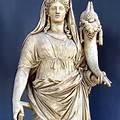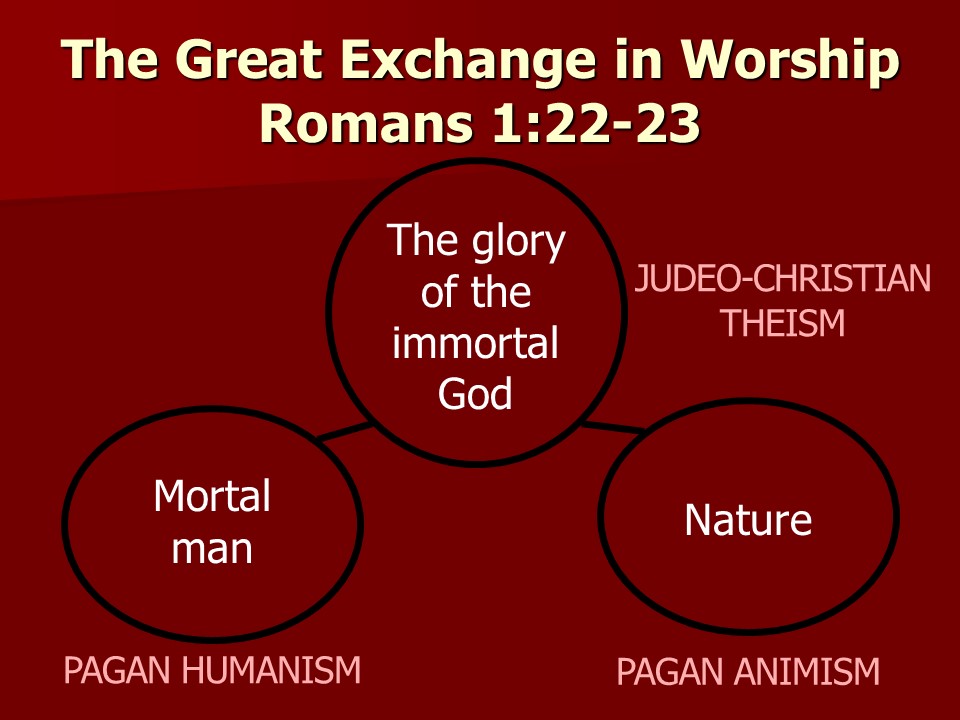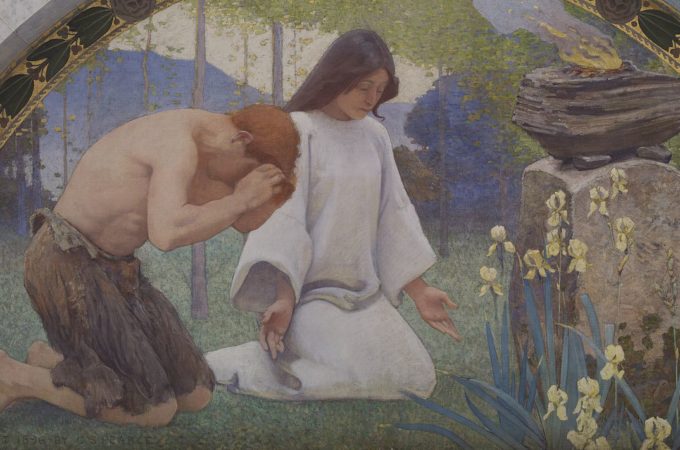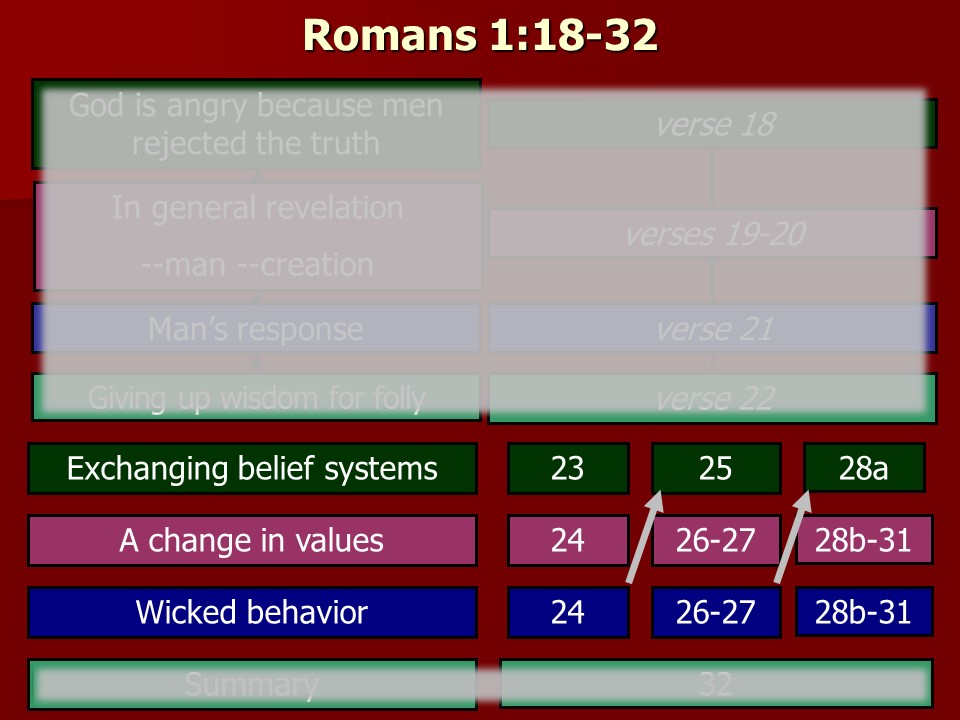Humans will worship something … who or what will it be?
In this series of posts we have been unpacking the truth of Romans 1:18-32. We have seen that humans reject the truth, even when God puts it right in front of us. And when we reject truth, we reject God. Which, in turn, results in the distortion of our humanity, and that has led to a strange new world of foolishness.
As indicated in the graphic, that brings us to verse 23.
Now, Paul argues that by suppressing the truth, and opting for foolishness, humans have made a great exchange. Not great as in grand or magnificent, but great as in profound. We have exchanged belief systems. This has naturally led to a change in values and this, in turn, leads to wicked behavior.
Two thousand years before Richard Weaver observed, “Ideas have consequences,” the Apostle Paul made the same argument. This concept is so important to human flourishing that Paul related it three times in the text. (Again, see the graphic.)
The great exchange started a chain reaction that radically changed the world. It all began with a change in belief system.
In modern societies, we try to solve problems on a behavioral level. But behavior is merely a symptom of a deeper problem, i.e. a faulty paradigm or sacred belief system, a faulty worldview.
Today’s moral relativism has jettisoned the concept of sin. Personal moral responsibility as a framework for behavior has disappeared. We think problems are rooted, not inside the person, but outside. All evil is institutional; only an all-powerful government can fix institutional evils.
Institutional evil exists, but all evil is birthed in the heart. This is Paul’s point. The problems of society always begin inside man. The great Russian novelist Aleksandr Solzhenitsyn discovered this reality one night in the gulag.
It was only when I lay there on rotting prison straw that I sensed within myself the first stirrings of good. Gradually it was disclosed to me that the line separating good and evil passes not through states, nor between classes, nor between political parties either, but right through every human heart, and through all human hearts. … Even within hearts overwhelmed by evil, one small bridgehead of good is retained; and even in the best of all hearts, there remains a small corner of evil.
The Bible describes our condition as two-fold. First, every human is made in the image of God (Genesis 1:26-27) and has tremendous worth. Second, each human is a sinner to the core (Romans 3:23). Evil thoughts, imaginations, words and choices emanate from within.
Paul begins the three sets of parallel passages with a great exchange:
- 1:23 – [They] exchanged the glory of the immortal God for images made to look like a mortal human being and birds and animals and reptiles.
- 1:25 – They exchanged the truth about God for a lie, and worshiped and served created things rather than the Creator—who is forever praised. Amen.
- 1:28(a) – they did not think it worthwhile to retain the knowledge of God,
Let’s look at each of these in turn.
From worship of God to worship of created things
V 23 includes the first reference to the great exchange: “[they] exchanged the glory of the immortal God for images made to look like a mortal human being and birds and animals and reptiles.”
“Exchanged” translates the Greek allassō: “to cause a difference by altering the nature or character of something, to substitute one thing for another.”
![]() “Image” is the Greek eikōn: “image, likeness, representation.” We get the English word icon from eikōn. We have changed the object of our worship from the invisible God and Creator of the universe to icons of created things.
“Image” is the Greek eikōn: “image, likeness, representation.” We get the English word icon from eikōn. We have changed the object of our worship from the invisible God and Creator of the universe to icons of created things.
Again, we turn from the glorious worship of the immortal God to the shameful worship of creatures: mortal human beings or non-human creatures. 
That is, we move from Judeo-Christian Theism (God as the center of all things), to Pagan Humanism (man as the center), or Pagan Animism (the worship of nature).
 Distilled to its essence, every religion and philosophy fits into one of three categories of answers to life’s persistent questions. We will worship either the sovereign God, or human beings, or nature.
Distilled to its essence, every religion and philosophy fits into one of three categories of answers to life’s persistent questions. We will worship either the sovereign God, or human beings, or nature.
Traditional cultures have worshipped nature in one of two forms. Pantheism sees all as god, polytheism reveres many finite deities that resemble creatures. The modern world is dominated by various forms of atheism or secular humanism. In this worship system (yes, worship), man is the center of the universe. Human worship is focused on mankind as a species or on oneself as a person.
 The first great exchange switches the focus of worship from the Creator to the creation. This exchange in gods brings a change in value systems, leading to a shift in behavior. Behavior produces consequences: good consequences if we worship the living God, bad consequences if we worship His creation.
The first great exchange switches the focus of worship from the Creator to the creation. This exchange in gods brings a change in value systems, leading to a shift in behavior. Behavior produces consequences: good consequences if we worship the living God, bad consequences if we worship His creation.
Exchanging truth for a lie
The second reference to the great exchange comes in 25: “They exchanged the truth about God for a lie, and worshiped and served created things rather than the Creator—who is forever praised. Amen.”
Here, “exchanged” is the Greek word metallassō. The prefix meta is added to the allaso of verse 23. This word means “to barter away, cease and start, one activity for another.” They exchanged truth (alētheia), facts that correspond to reality, for a lie (pseudos, root of our English term pseudo).
It’s a poor trade-off to give up worship and service of the glorious God for a falsehood.
Whether we worship God, or some aspect of His creation, we will worship. We were made to worship. We cannot avoid worshipping any more than birds can avoid flying or whales swimming. If we deny God, we do not cease to worship, we simply worship created things, things made by God or by human beings (Psalm 115:2-8; Is. 44:9-20).
There are no atheists, only idolaters.
Fyodor Dostoyevsky captures this alternative reality in The Brothers Karamazov:
To live without God is nothing but torture … Man cannot live without kneeling … If he rejects God, he kneels before an idol of wood or of gold or an imaginary one … They are all idolaters and not atheists. That’s what they ought to be called.
Note the two-fold activity: they worshipped (sebazomai – honor religiously), and served (latreuō – minister or serve in religious duties) the idol.
What are some of the idols people worship? What is the focus of your adoration and time?
What we worship determines our culture
We see the third reference to the great exchange in verse 28(a): “Furthermore … they did not think it worthwhile to retain the knowledge of God.”
This is stated differently than the first two: “they did not think it worthwhile” (regard as worthwhile, judge as good). Although they knew God existed (1:21), they did not think it worthwhile to retain (echō: hold on to a relationship with, personally acknowledge, experience) their knowledge of God’s existence by entering into relationship with Him.
They did not think it important to move from the knowledge that God existed to acknowledging Him in worship and service.
These three passages show that there is, on a personal level, an exchange of sacred belief systems. We are free to choose our worldview, but not the consequences of that worldview. To say it differently, we become like the God (or gods) we worship. On a corporate level our cult (worship) will determine our culture, and our culture drives the kind of society we produce. While worship is universal (as we have said, even atheists worship), the object of our worship varies. Thus the outworking of that worship in culture making varies.
We need to be careful what we wish for. God may give it to us! (See Numbers 11:20; Ps 78:29; 106:13-15). When we deny God and live in delusion, we receive the consequences of that delusion. Ideas have consequences.
It’s not complicated. We either honor the Creator or we worship created things. The object of our worship will determine if we flourish or flounder in our lives and communities.
- Darrow Miller







